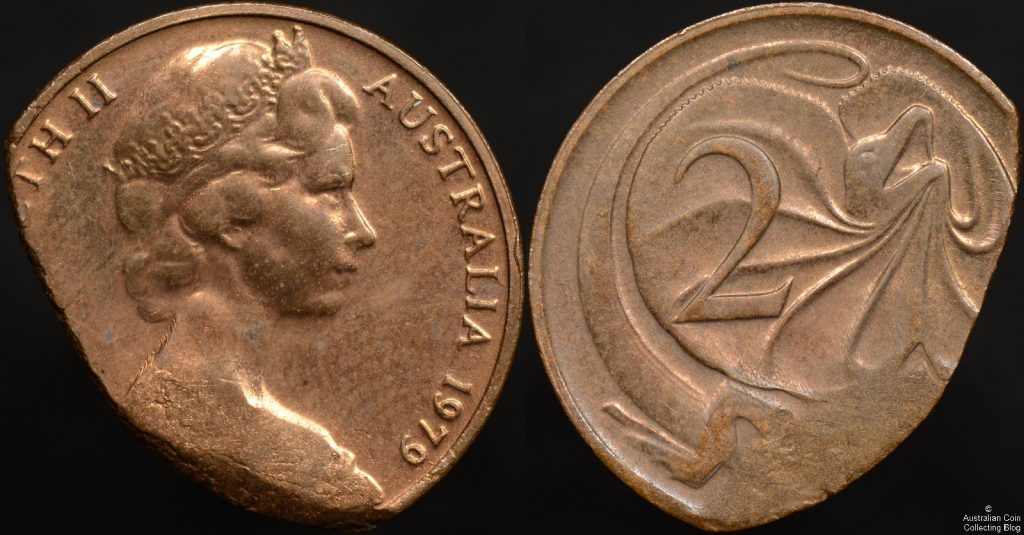Several months ago I saw a collector post images of an Australian penny struck on a defective and incomplete planchet onto a well known Facebook coin group. The collector wasn’t sure if the coin was a genuine error, and if it was, what it actually was. The error itself was spectacular and not dis-similar to the 1979 two cent struck on a scrap planchet as shown in Figure 1.
A few well known coin identities correctly identified that the penny in question was indeed a genuine error and went on to explain how it had come about. Unfortunately those tiny voices were drowned out by the veritable chorus of comments bellowing “damage” and “PMD” and “I could make that with a grinder”. I doubt the original poster of the interesting penny error knew which opinion to believe. To their credit they took the time to send images to a well known Australian coin collector who verified that the penny was indeed a genuine error. It’s unfortunate that this even had to happen but it shows us that:
“Social media is wonderful because it gives everyone a voice and an opinion. Social media is terrible because it gives everyone a voice and an opinion.”
The above is paraphrased from a video I made several weeks ago. In that video I said that the power of social media is undeniable but when concerning technical matters it is often nothing more than terrible. The internet empowers people to spend a few minutes reading or watching videos, form a bad opinion and then voice that opinion. Unfortunately the democratisation of many forms of social media can give that opinion the same weight as subject matter experts. In the case of the penny error mentioned earlier this was very much the case, with correct opinions being drowned out by arguments put forward by posters who clearly had no actual knowledge of even the basics of coin manufacturing.
“..the one thing people are most likely to be ignorant of is the extent of their own ignorance—where it starts, where it ends, and all the space it fills in-between”[1]
The above was said by David Dunning, a well known American psychologist and co-author of a paper with Justin Kruger in 1999 called “Unskilled and Unaware of It: How Difficulties in Recognizing One’s Own Incompetence Lead to Inflated Self-Assessments”. In that paper they proposed a cognitive bias called “The Dunning-Kruger Effect”.
One aspect of the Dunning-Kruger effect was measured by asking people of low ability in a particular subject area to self-assess what they knew about that subject then to objectively measure their actual knowledge. This was done across a wide range of subject areas and it was found that people with a low level ability in a particular subject consistently over-estimated their abilities in that area[2]. Subsequent studies conducted by others across have shown a similar bias present in a wide range of subject areas.
I propose that this aspect of the Dunning-Kruger effect is alive and well in coin groups on social media. Often new collectors with little knowledge of numismatics are those who express their opinions the loudest and many times those opinions are terribly wrong. How can this problem be addressed?
I am an advocate for strong moderation on technical coin groups on social media. If you’re going to run a technical coin group on social media be prepared to delete mis-information and incorrect opinions. If you don’t then your group reflects badly on yourself and is actually detracting from the hobby rather than adding to it.
If you’ve got a technical question about a coin, seek out subject matter experts and ask them directly rather than making general posts on social media. If you don’t you’ll be bombarded with answers and you won’t know which ones are educated and which ones are delivered from a foundation of ignorance.
If you’re a new collector, resist the temptation to offer up opinions on subjects you know little about. Remember “the one thing people are most likely to be ignorant of is the extent of their own ignorance”. In other words, you don’t even know what you don’t know.
If you’re a new collector, always seek to educate yourself. Seek out subject matter experts, read everything you can, subscribe to magazines, consult reputable websites, and never stop asking questions. No-one was born an expert and we all had to start somewhere.
[1] Dunning, David; (2011). “The Dunning–Kruger Effect: On Being Ignorant of One’s Own Ignorance”. Advances in Experimental Social Psychology. Volume 44, Chapter 5. ISSN 0065-2601
[2] Schlösser, Thomas; Dunning, David; Johnson, Kerri L.; Kruger, Justin (1 December 2013). “How unaware are the unskilled? Empirical tests of the “signal extraction” counter-explanation for the Dunning–Kruger effect in self-evaluation of performance”. Journal of Economic Psychology. 39: 85–100. doi:10.1016/j.joep.2013.07.004. ISSN 0167-4870. Archived from the original on 15 May 2022. Retrieved 20 December 2021.
A version of this article was originally published in the free online coin magazine, Independent Coin News.
